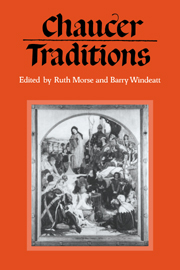Book contents
- Frontmatter
- Contents
- List of contributors
- Preface
- Note on the text
- 1 Chaucer traditions
- 2 Gower–Chaucer's heir?
- 3 Chaucer and Lydgate
- 4 Hoccleve and Chaucer
- 5 Chaucer and fifteenth-century romance: Partonope of Blois
- 6 Some Chaucerian themes in Scottish writers
- 7 The planetary gods in Chaucer and Henryson
- 8 Gavin Douglas: ‘Off Eloquence the flowand balmy strand’
- 9 Skelton's Garlande of Laurell and the Chaucerian tradition
- 10 Chaucerian metre and early Tudor songs
- 11 Aspects of the Chaucerian apocrypha: animadversions on William Thynne's edition of the Plowman's Tale
- 12 The shape-shiftings of the Wife of Bath, 1395–1670
- 13 The genius to improve an invention: transformations of the Knight's Tale
- 14 From the Clerk's Tale to The Winter's Tale
- 15 The Virtuoso's Troilus
- 16 Rewriting romance: Chaucer's and Dryden's Wife of Bath's Tale
- 17 Chaucer's religion and the Chaucer religion
- 18 A list of the published writings of Derek Brewer
- Index
2 - Gower–Chaucer's heir?
Published online by Cambridge University Press: 23 September 2009
- Frontmatter
- Contents
- List of contributors
- Preface
- Note on the text
- 1 Chaucer traditions
- 2 Gower–Chaucer's heir?
- 3 Chaucer and Lydgate
- 4 Hoccleve and Chaucer
- 5 Chaucer and fifteenth-century romance: Partonope of Blois
- 6 Some Chaucerian themes in Scottish writers
- 7 The planetary gods in Chaucer and Henryson
- 8 Gavin Douglas: ‘Off Eloquence the flowand balmy strand’
- 9 Skelton's Garlande of Laurell and the Chaucerian tradition
- 10 Chaucerian metre and early Tudor songs
- 11 Aspects of the Chaucerian apocrypha: animadversions on William Thynne's edition of the Plowman's Tale
- 12 The shape-shiftings of the Wife of Bath, 1395–1670
- 13 The genius to improve an invention: transformations of the Knight's Tale
- 14 From the Clerk's Tale to The Winter's Tale
- 15 The Virtuoso's Troilus
- 16 Rewriting romance: Chaucer's and Dryden's Wife of Bath's Tale
- 17 Chaucer's religion and the Chaucer religion
- 18 A list of the published writings of Derek Brewer
- Index
Summary
The idea of Gower as Chaucer's heir looks at first unpromising. It seems that Gower was the older and that, although he outlived Chaucer and the century by eight years, by then he was blind and poetically inactive. ‘Chaucer's master’, as Dr Johnson called him, has usually been counted as creditor and Chaucer as debtor in scholarly reckonings of the literary commerce between them. Gower appears older and also older-fashioned in liking long allegorical complaint poems and in choosing French and Latin for his first and second great works. When he turned to English narrative verse at the age of about fifty, it was to octosyllabic couplets – the form used by Chaucer in his earliest poem, the Book of the Duchess, and in the Roman de la Rose. The typical differences in language and metre between the two poets make it hard to trace possible allusions from one to the other. For, if poetic allusion to the words of another poet depends on the text of the earlier work already being established and familiarly resonant, then the case of Chaucer and Gower is problematic. As co-workers in the newly-delved field of authorial poetry in English, it is doubtful that either could assume that the words of any text of the other's making would be recognized in quotation. Yet the poets allude to each other's work and appear to be mutually indebted.
- Type
- Chapter
- Information
- Chaucer TraditionsStudies in Honour of Derek Brewer, pp. 21 - 38Publisher: Cambridge University PressPrint publication year: 1990



